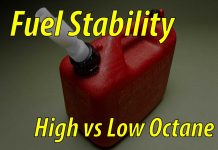Octane: What Is It And Why Should I Care?
 Without going into depth about chemistry, octane refers to the measure of a fuel’s resistance to detonation. The higher the octane level, the less susceptible fuel is to pre-ignition and detonation, also known as “knock.”
Without going into depth about chemistry, octane refers to the measure of a fuel’s resistance to detonation. The higher the octane level, the less susceptible fuel is to pre-ignition and detonation, also known as “knock.”
What is Pre-ignition?
Pre-ignition is when the fuel/air charge within the combustion chamber ignites prematurely. When pre-ignition occurs, the charge lights at not only the spark center but also from hot spots within the combustion chamber. Pre-ignition causes an uneven flame to happen, causing potential damage to the pistons on the power stroke.
What is Detonation
A detonation, which is a more severe scenario, is when the charge accidentally lights off, but without a spark. Accidental combustion tends to happen towards the end of a compression stroke when both the pressure and temperature are highest. Detonation is the equivalent of taking a hammer and beating on the pistons. The sound you’ll hear during this event is similar to the sounds of a hammer hitting a piston.
How Do Higher Octanes Increase Performance?
Higher octane fuels are necessary for various reasons, such as being useful for high-performance engines, older engines, or forced induction engines. With high-performance engines, the air-fuel charge is typically compressed and subjected to higher pressures. And higher pressure means an increased risk of detonation.
Older engines benefit from fuels with high octane levels, especially if they are full of carbon deposits. The carbon deposits effectively reduce the volume of the compression chamber, thereby increasing the compression ratio. And since the carbon deposits will most likely be non-uniform across all the cylinders, high octane fuels can help smooth things out.
To avoid detonation, knock sensors delay the spark timing right as it is about to detonate. Delaying the spark timing robs power, which is why octane increases the horsepower potential of an engine. Increasing the octane of the fuel raises the engine’s knock threshold, maintaining optimal spark timing. Increasing the knock threshold allows optimal combustion and charge expansion to occur.
How Is Octane Measured?
The American Society for Testing and Materials (ASTM) uses the measurement standard RON (Research Octane Number) when determining a fuel’s octane. I will get into that in a different article. You can see this number on the pump you use at the gas station. The next time you’re at the gas station, take a look at the gas pump, and you’ll see this number.
If you have any questions or anything to add, please leave them in the comments or on our FaceBook page!





